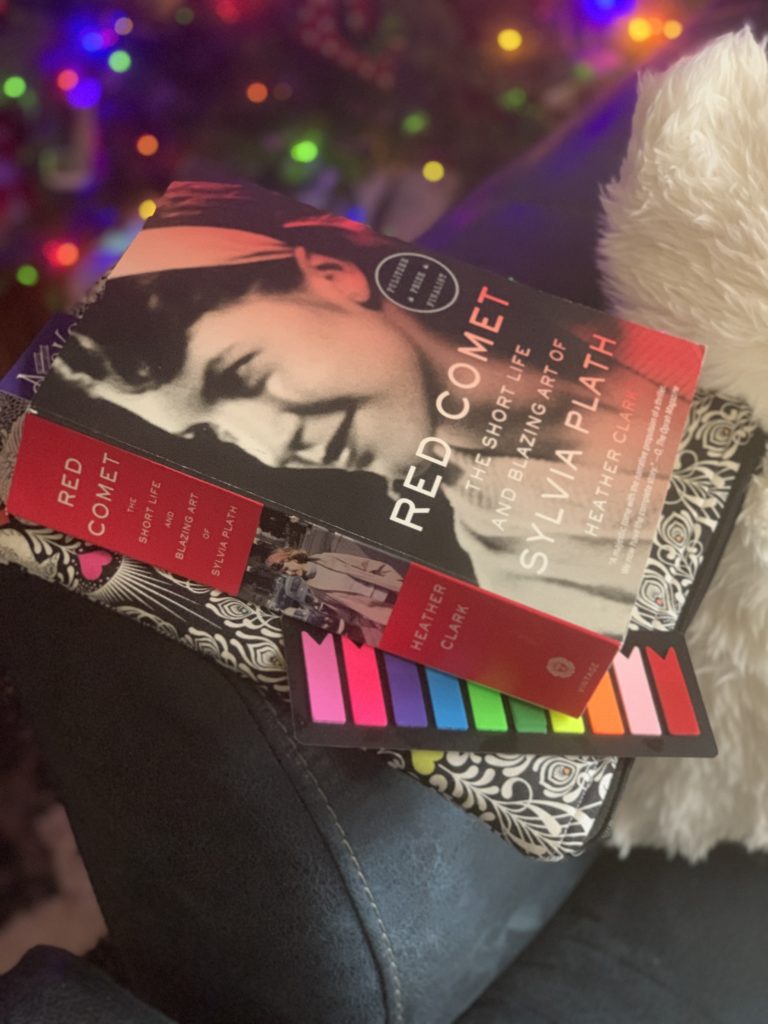a book, especially a large, heavy, scholarly one.

Clark’s clear-eyed portraits of Hughes, his lover Assia Wevill, and other demonized players in the arena of Plath’s suicide promote a deeper understanding of her final days. Along with illuminating readings of the poems themselves, Clark’s meticulous, compassionate research brings us closer than ever to the spirited woman and visionary artist who blazed a trail that still lights the way for women poets the world over.
Sylvia Plath has mesmerized me since I was 12.
This book is so good.
I am enjoying it thoroughly.
“Tired of the cliché of the hysterical female writer, and of the enduring focus on Plath’s death rather than her trailblazing poetry and fiction, Clark used a wealth of new material – including juvenilia, unpublished letters and manuscripts, and psychiatric records – to explore Plath’s literary landscape.”
That exactly.
Nothing new that the wrong focus was used. Especially for women. Especially if they’re brilliant, outspoken and *gasp* intelligent. So intelligent it’s threatening. (Eye roll.) I’m not saying she was perfect. I’m saying the focus should be her life’s work. Not how she died.
Just an amazing read. Soaking it in.
Mirror
I am silver and exact. I have no preconceptions.
Whatever I see I swallow immediately
Just as it is, unmisted by love or dislike.
I am not cruel, only truthful‚
The eye of a little god, four-cornered.
Most of the time I meditate on the opposite wall.
It is pink, with speckles. I have looked at it so long
I think it is part of my heart. But it flickers.
Faces and darkness separate us over and over.
Now I am a lake. A woman bends over me,
Searching my reaches for what she really is.
Then she turns to those liars, the candles or the moon.
I see her back, and reflect it faithfully.
She rewards me with tears and an agitation of hands.
I am important to her. She comes and goes.
Each morning it is her face that replaces the darkness.
In me she has drowned a young girl, and in me an old woman
Rises toward her day after day, like a terrible fish.
“Sylvia Plath was one of the most dynamic and admired poets of the 20th century. By the time she took her life at the age of 30, Plath already had a following in the literary community. In the ensuing years her work attracted the attention of a multitude of readers, who saw in her singular verse an attempt to catalogue despair, violent emotion, and obsession with death. In the New York Times Book Review, Joyce Carol Oates described Plath as “one of the most celebrated and controversial of postwar poets writing in English.” Intensely autobiographical, Plath’s poems explore her own mental anguish, her troubled marriage to fellow poet Ted Hughes, her unresolved conflicts with her parents, and her own vision of herself. On the World Socialist web site, Margaret Rees observed, “Whether Plath wrote about nature, or about the social restrictions on individuals, she stripped away the polite veneer. She let her writing express elemental forces and primeval fears. In doing so, she laid bare the contradictions that tore apart appearance and hinted at some of the tensions hovering just beneath the surface of the American way of life in the post war period.” Oates put it more simply when she wrote that Plath’s best-known poems, “many of them written during the final, turbulent weeks of her life, read as if they’ve been chiseled, with a fine surgical instrument, out of arctic ice.” Plath has inspired countless readers and influenced many poets since her death in 1963″
~ Poetry Foundation
This will take me several, several months to read, for that, I am just thrilled.


